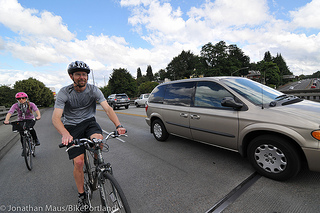If you get hit on a Portland street by a commercially operated vehicle, you don’t want it to be an UberX on its way to its next fare.
On the other hand, you’ll be better off than if you had been hit by one of many normal private cars.
As the ride-hailing mobile app unexpectedly lauched Friday night in defiance of a city where the possible penalties for operating an unlicensed taxi can include jail time (but are reportedly more likely to involve up to $2,250 in fines), it raised a side issue for other users of the city’s roads.
It’s one we discussed briefly in our September Q&A with Uber’s regional manager, but Friday’s development gives it fresh urgency.
Here’s the issue:
If you get hit by a legal taxi in Portland and the driver was at fault, any medical bills and other damages will be covered by a general liability insurance policy of at least $1 million.
That’s also the case for an Uber car that’s carrying a passenger.
But if there’s no passenger in the car, the car is in a legal gray area. It’s usually the driver’s personal vehicle and covered by their personal insurance. But if the car is en route to pick up a fare, it’s arguably being operated as a business — in which case the personal insurance policy typically doesn’t apply.
Earlier this year, Uber began to offer $50,000 of contingent personal injury coverage per victim (and $100,000 per collision) for drivers involved in collisions while the Uber app was active but who aren’t covered by their own insurance. As part of a deal that let it begin operating legally in Seattle, Uber agreed to boost such coverage in that city to $100,000 per individual and $200,000 per collision.
For personal drivers in Oregon, the legal minimum liability coverage is $25,000 per individual.
In an interview Friday night, personal injury attorney Charley Gee of Swanson, Thomas, Coon and Newton called Uber’s $50,000 coverage for drivers on their way to pick up fares “a huge issue.”
“$50,000 certainly doesn’t go far,” Gee said: “An ambulance ride, a night in the hospital and a few doctors.”
Advertisement
In Gee’s opinion, “if Uber is going to be using these cars to make money, basically, they should be at a higher level of insurance.”

often handles bike-related injury
cases.
Uber argues that it’s not a taxi service, only a digital platform that lets independent drivers connect with passengers, and that it’s providing insurance coverage voluntarily.
“Uber partner drivers are not driving taxis, do not wait in taxi load zones, pick individuals up off the street and there is no incentive or reason to circle or cruise for passengers,” Uber regional manager Brooke Steger wrote in an email Friday night.
Gee added that despite his concerns about Uber’s insurance coverage and the possible loss of traditional taxi driving as a ladder into the U.S. job market, he likes the concept of a company that makes it easier for him to get home from a bar safely.
There’s plausible evidence that Uber has reduced drunk driving somewhat in cities where it operates.
“I think maybe Uber’s probably the spearhead of a sharing economy that will work, and work well,” Gee said. “Hopefully it does.”
You can read more about Uber’s surprise illegal Portland launch and the city’s initial response at Willamette Week, the Mercury, The Oregonian and GeekWire, or read our two–part series from the fall for arguments for and against the company.


